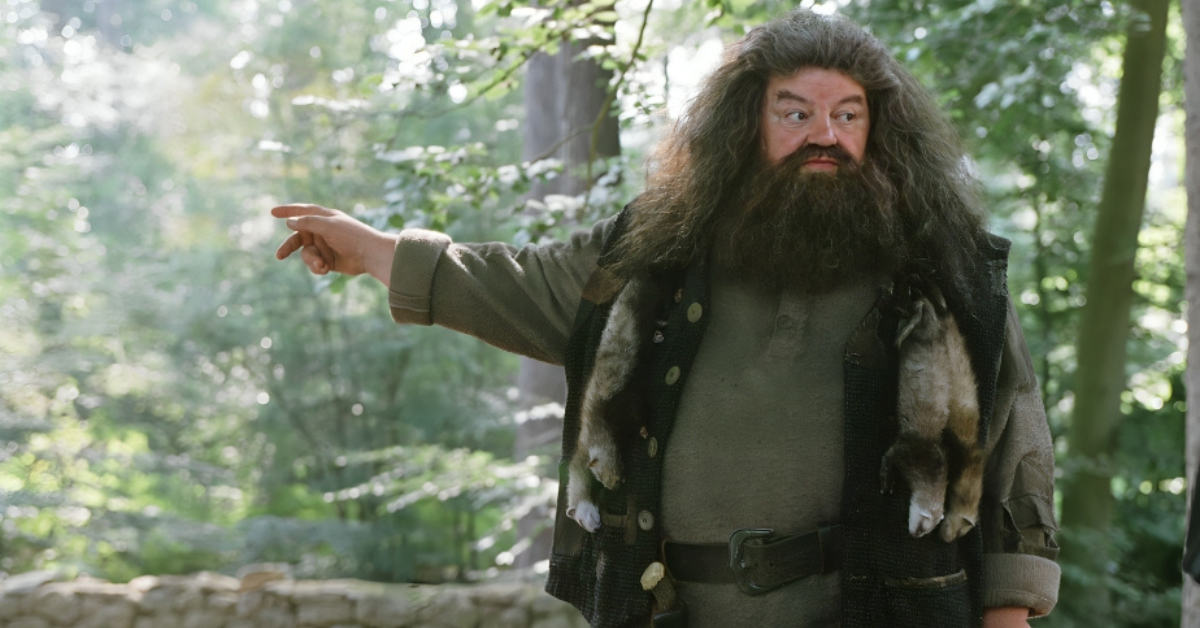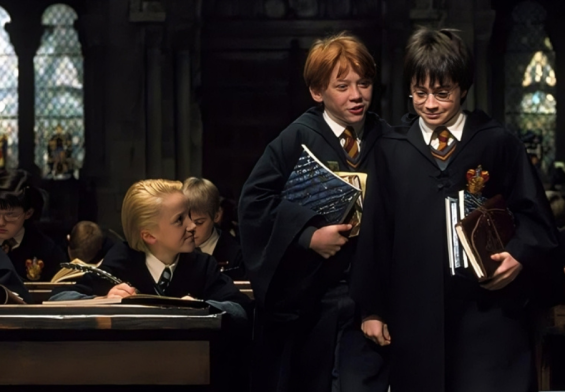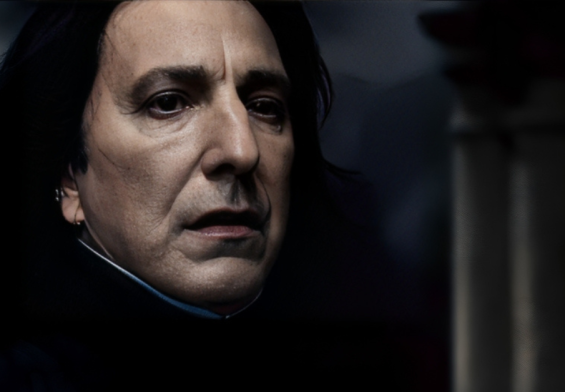
Rubeus Hagrid’s first wand was rather bendy, 16 inches long, and made of oak.
It has been expressed that those with oak wands usually have an affinity with the magic of the natural world, that a bendy wand signifies a high level of adaptability and personality, and that the significant length of his wand is representative of his large stature and enormous personality.
Recommended for You:- The Most EVIL Dark Wizard You’ve NEVER Heard Of
- The Most POWERFUL Potion Maker Nobody Talks About
- The Shocking Truth About the Unforgivable Curses!
- Why Lucius Malfoy Never Faced Azkaban After Two Wizard Wars?
Hagrid’s Umbrella Wand
You can tell a lot about a person from their wand, but if you met Hagrid as an adult, you’d just have to guess these things about him, because the Hagrid we know walks around with an umbrella.
Of course, there’s more to Hagrid’s umbrella wand than meets the eye, but the fact remains that Hagrid does not carry a wand in the traditional sense, the main reason being that his wand was snapped while he was still just a boy.
Falsely Accused and Expulsion
During his third year at Hogwarts, Hagrid was falsely accused by Tom Riddle of releasing a monstrous creature on the school that killed a muggle-born witch named Myrtle Warren.
As a result of this, his wand was destroyed by the British Ministry of Magic, but the actions taken towards Hagrid always seemed extreme and inconsistent.
Because there was insufficient evidence to prosecute Hagrid, he avoided Azkaban, at least the first time around. However, he still somehow landed an expulsion from Hogwarts and a snap to his wand. Today, we’re going to be diving into the real reasons for Hagrid’s unfair treatment.
Hagrid’s Parentage
Hagrid’s parentage was a pretty poorly kept secret. To most, it seemed obvious that he was born from a mixed relationship between a giantess and a wizard.
Still, Hagrid tried to keep the details a secret, at times, although he was never known as Fridwulfa, a twenty-foot-tall giantess who was truly a force to be reckoned with, with a natural resistance to most spells and curses.
Giant Culture and Family Dynamics
Assessors would have taken over half a dozen wizards to defeat Hagrid’s mother in a fight. For that reason, the wizarding world feared giants like Fritwalfa most of all, which makes her marriage to Hagrid’s father, Mr. Hagrid, or the stranger.
Although giantesses and men had been known to wed each other, it wasn’t a very common practice. As you could guess, wizards and witches frowned upon mixed marriages, and even the giants, who valued size and power above all else, looked down on their peers who married weak human wizards.
But Fritwalfa and Mr. Hagrid actually gave their relationship an honest attempt, and they were happy for a while, that is until December of 1928, when Fritwalfa and Mr. Hagrid welcomed their son, Rubius, into the world.
Fridwulfa’s Disappointment
In giant culture, they prided themselves on having the largest, strongest babies, and after a quick glance at the infant Rubius, Fritwalfa realized that she had failed. As a half-giant, Rubius was a fraction of the size of other giant babies.
By the time Hagrid was three years old, it became glaringly apparent that he would never grow to the same size as other giants, which caused Fridwulfa’s loyalty to falter. Ashamed by her child’s small stature, Fridwulfa decided to run away, fleeing back to her giant colony.
Life with His Father
In the years that followed, young Rubius Hagrid lived a simple life with his father. The pair lived in the west country of England, near the Forest of Dean, which is the cause for Hagrid’s distinctive accent.
Although Hagrid and his father had a strong relationship, Hagrid’s social life suffered outside of the home. As a half-giant, other parents would often warn their children about playing with him.
It wasn’t until Hagrid received his acceptance letter to Hogwarts School of Witchcraft and Wizardry that the young boy thought he could finally find a close-knit group of friends.
Hagrid’s Magical Journey
Before embarking on his journey to Hogwarts, young Hagrid, just like so many other students before him, made the trek to Diagon Alley, specifically Ollivanders, where he would receive his first wand.
It seems strange that for as long as we’ve known Hagrid, he’s held an umbrella in place of a wand. And while we now know that Hagrid’s original wand is inside of this umbrella, the reality is that it was once a fully functioning magical item in its own right.
In 1940, Hagrid began his first semester at Hogwarts School, a process that Hagrid found quite bittersweet. While attending Hogwarts would provide the opportunity to meet other magical children and expand his magical horizons, it also meant that he would have to leave behind his beloved father.
Struggles at Hogwarts
Hagrid also quickly realized that, in some aspects, Hogwarts wasn’t all too different from the real world. At school, he continued to suffer, as his fellow students ridiculed and bullied him.
If he were anyone else, he’d use his natural brawn to turn the tide against his bullies, but Hagrid’s low self-esteem and non-violent disposition made him a natural target.
This caused Hagrid to instead search for companionship through magical beasts and creatures, showcasing very early on his affinity for the natural world and the creatures within it. However, this hobby did land Hagrid in trouble on more than a few occasions.
As a student, Hagrid raised werewolf cubs under his bed, trod off into the Forbidden Forest to rustle trolls, and even acquired an acromantula that would heavily impact his future. By his third year at school, Hagrid had grown to nearly 11 feet in height, but unfortunately, he continued to struggle socially.
Tom Riddle’s Deception
To make matters worse, Hagrid’s father, Mr. Hagrid, suddenly passed away, and this wasn’t even close to the end of Hagrid’s streak of bad luck. Eventually, Tom Riddle, who was only a few years older than Hagrid at the time, decided to frame Hagrid for a recent murder at the school.
Riddle was actually the one responsible for the crime, having opened the Chamber of Secrets and released the Basilisk within. However, he was able to convince the Ministry of Magic that one of Hagrid’s dangerous pets, an acromantula named Aragog, was the culprit.
Hagrid’s Unfair Punishment
In the aftermath, Hagrid was expelled from Hogwarts and forbidden by the ministry from using a wand ever again. However, thanks to Albus Dumbledore’s quick intervention, Hagrid was saved from going back into the real world as an orphan.
Dumbledore managed to land Hagrid a role, studying how to become a groundskeeper. This gesture of kindness might have been enough to keep Hagrid from a life of crime. With his father gone, the young half-giant had nowhere to turn, and the fate of giants in the wizarding world was usually a bloody, painful one.
Because Hagrid was expelled in his schoolboy days, he never finished his education. This meant that he would forever remain an unqualified wizard, and subsequently barred from performing magic.
Inconsistencies in Punishment
There are a number of issues with this besides the obvious. First of all, not even prisoners of Azkaban have their wands snapped. When a witch or wizard is found guilty of a crime punishable by imprisonment, their material items, including their wands, are taken from them.
However, these items, wands included, are not destroyed. No one knows for certain where they are kept exactly, but what we do know is that they are kept somewhere, entirely intact.
This is proven throughout the series by the fact that multiple witches and wizards who have served time at the wizarding prison of Azkaban, such as Igor Karkarov and Lucius Malfoy, get their wands back when they re-enter magical society.
Post-Azkaban Wand Return
We also know that these individuals continue to practice magic. Igor Karkarov even goes on to become the headmaster of Dermstrang Institute, the wizarding school in Eastern Europe.
Clearly, both of these wizards, who were known Death Eaters during Voldemort’s first rise to power, served their time at Azkaban, and then had their items returned to them, either by the Dementors at the prison or the ministry.
Some fans have even speculated that convicts’ possessions, including their wands, are released to their next of kin. Perhaps those leaving Azkaban retrieved their belongings from family members upon their release.
Even Bellatrix Lestrange, who was sentenced to life imprisonment in Azkaban for performing the Cruciatus Curse on Alice and Frank Longbottom, managed to get her wand back after she escaped from the prison.
Hagrid’s Injustice
This means that even if a convict is never meant to be released from Azkaban, and is supposed to rot away in prison for the rest of their life, their wand is still not destroyed. But yet, a third-year student had his wand snapped in half, and his magical future taken away from him for a crime he didn’t even commit.
Hagrid was expelled from Hogwarts at the mere age of 13, his wand taken from him and destroyed, his future also taken from him and destroyed. Told that he could no longer practice magic, Hagrid was turned away from the majority of the wizarding community in disgrace before he even reached the age of 14.
Comparative Expulsions
I suppose you could make the argument that the severity of Hagrid’s expulsion was due to the fact that a young witch was killed as a result of the Chamber of Secrets being reopened.
But that doesn’t actually make all that much sense when you consider that not even convicted criminals who actually torture and murder people with their own hands lose their wands when they’re sent to Azkaban.
The other issue here is that there are no other expulsions on record where the wand is snapped, and it just so happens that another major Harry Potter character was accused of very similar crimes but faced a vastly different outcome.
This character, of course, was Newt Scamander, who faced expulsion at the age of 16. In the film Fantastic Beasts and Where to Find Them, there is an article directly addressing the details and outcomes of Newt’s crimes.
Newt Scamander’s Case
Notes: Proposed expulsion from Hogwarts School of Witchcraft and Wizardry due to the illegal possession of a magical beast, causing endangerment of human life and violation of animal welfare laws.
Magical Beast: Jarvey level 3
Punishment: Expulsion from Hogwarts School of Witchcraft and Wizardry.
Dumbledore may have stepped in to defend Newt, and this expulsion may not have been enforced to the same extent, but the fact remains that Hagrid faced vastly different consequences for essentially the same crime.
Prejudice Against Giants
And why is that? Unfortunately, I think that it’s because he’s a half-giant. And giants, if you didn’t know, are some of the most hated creatures in the wizarding world.
Albus Dumbledore: Extend them the hand of friendship now, before it is too late, or Voldemort will persuade them, as he did before, that he alone among wizards will give them their rights and their freedom!
Cornelius Fudge: You – you cannot be serious. If the magical community got wind that I had approached the giants, people hate them, Dumbledore. End of my career.
Prejudice among wizardkind towards giants, and many other non-human species, is a well-documented issue in the wizarding world.
Giants have often been portrayed as aggressive and dangerous creatures in wizarding literature and folklore, perpetuated by the name of the wizard. Exploiting stereotypes has led to fear and discrimination.
Historical Bias and Fear
The bias against giants can be traced back to historical conflicts between giants and wizards, as well as the portrayal of giants as enemies in stories and legends. This negative depiction has perpetuated prejudice and fear of giants among wizardkind.
Therefore, when Hagrid was accused of opening the Chamber of Secrets during his time at Hogwarts, the bias against giants likely influenced the severity of the punishment he received. Despite the lack of concrete evidence against him, Hagrid was expelled from Hogwarts and had his wand snapped, a punishment that was incredibly harsh and disproportionate considering the circumstances.
This treatment reflects the deep-rooted prejudice and discrimination that exists in the wizarding world, particularly towards magical beings with non-human heritage. Adding insult to injury, I think that another reason Hagrid was treated so poorly was because the Ministry feared him.
Physical Advantages of Giants
Being a giant comes with several physical advantages that make them one of the most powerful creatures in the wizarding world. Firstly, giants are incredibly large and physically imposing, with immense raw strength that is proportionate to their size.
Their size gives them natural physical advantages over small creatures, allowing them to overpower them with ease. This raw power can make them difficult to detain or control, even for multiple wizards working together.
Secondly, giants are highly durable and resistant to damage. Their large size and tough skin make them much harder to injure than other creatures. The spells that would incapacitate or harm normal creatures may have limited effects on giants, making them formidable opponents in battle or other confrontations.
Finally, giants have heightened senses. Their hearing and sense of smell are stronger than that of normal humans, making them more aware of their surroundings and better able to detect danger or prey.
Hagrid’s Physical Power
And if you add those obvious physical advantages with the ability to cast spells, well, then you’ve got yourself a pretty powerful individual. This was of course the case with Hagrid. We see this in the books when Hagrid takes on a group of trained aurors without a wand and wins.
Hagrid took two massive swipes at his closest attackers, judging by their immediate collapse, they had been knocked cold. Harry saw him double over and thought for a moment that he had finally been overcome by a spell, but on the contrary.
Next moment Hagrid was standing again with what appeared to be a sack on his back. Then Harry realized that Fang’s limp body was draped around his shoulders. “Get him, get him,” screamed Umbridge, but her remaining helper seemed highly reluctant to go within reach of Hagrid’s fists.
Indeed, he was backing away so fast he tripped over one of his unconscious colleagues and fell over. Hagrid had turned and begun to run, with Fang still hung around his neck. Umbridge sent one last stunning spell after him, but it missed, and Hagrid, running full pelt toward the distant gates, disappeared into the darkness.
Can you imagine if Hagrid had been wielding a wand and was backed by a fully-fledged magical education? In short, Hagrid’s wand was snapped not because he was being legitimately punished for crimes that he had likely committed, but instead due to inherent prejudice towards giants, and fear of how powerful Hagrid could become with a magical education.
Hagrid’s Magical Education
But now you might be wondering, did Hagrid ever finish his magical education? In The Chamber of Secrets, Hagrid is finally exonerated for his alleged involvement in the opening of the chamber. His name is cleared when it is revealed that the true culprit behind the attacks and the opening of the chamber was Tom Riddle.
With the help of Harry Potter and his friends, the truth about Hagrid’s innocence comes to light, and he is vindicated. Because Hagrid was expelled in his schoolboy days, he never finished his education.
Post-Exoneration Magic
This, however, given that his name was eventually cleared, should make sense that his ability to perform magic would be reinstated. J.K. Rowling was actually asked this exact question in an interview.
Since Hagrid’s name was cleared in book 2, will he ever be allowed to do magic openly again?
He’s allowed—he’s been allowed to do magic openly ever since he became a teacher, but because he was never fully trained, his magic is never going to be what it should be—he is always going to be a bit inept.
And so Hagrid, after waiting a whopping 50 years, finally got to perform magic openly again.
But I think it’s safe to say that as far as the series is concerned, and the actions of the Ministry of Magic, Hagrid got it worse than pretty much anyone, all because the wizarding world is so intolerant.



